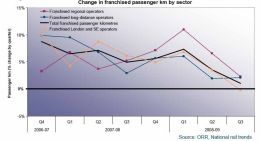Posted 26th February 2009 | No Comments
Passenger growth at lowest for five years

GROWTH in passenger travel on Britain’s railways has fallen to its lowest rate for five years — and in London and the South East it has fallen to zero.
Growth in passenger kilometers traveled on inter-city and regional services fell below five per cent in the third quarter.
And there was a small fall in the number of passenger journeys – down 0.3 per cent on the same quarter last year, compared with a 6.5 per cent increase the year before.
The figures are given in the National Rail Review monitor covering the third quarter of 2008-09 (October - December 2008) published by the Office of Rail Regulation.
Bill Emery, ORR chief executive said: “While our figures show the growth in passenger numbers is slowing, together with a small reduction in the number of passenger journeys, there has not yet been the significant reductions in rail travel that some have expected.”
He added: “The mainline railway is not immune from the recession and rail freight is taking the brunt of this.”
The ORR says train punctuality continued to improve. “We welcome the continuing good news from the mainline railway. The train operators and Network Rail are delivering the highest levels of train punctuality and passenger satisfaction we have seen in years,” said Bill Emery.
He said Network Rail must now “deliver substantial enhancements to its network as well as contributing in a major way to further improvements in performance and safety, and continue to expand network capacity, all while steadily improving its efficiency.
“The enhancements include major schemes such as Thameslink, capacity enhancements at Reading, and the Glasgow Airport rail link.
“Network Rail will be publishing the first part its five-year delivery plan at the end of February with the second part due by the end of March, and this will set out its commitments and plans for its customers and all users of the railway.
“We will be holding Network Rail and its industry partners to deliver on these commitments and as we set out in our own strategy, we see this as one of our key roles for the next five years.”
